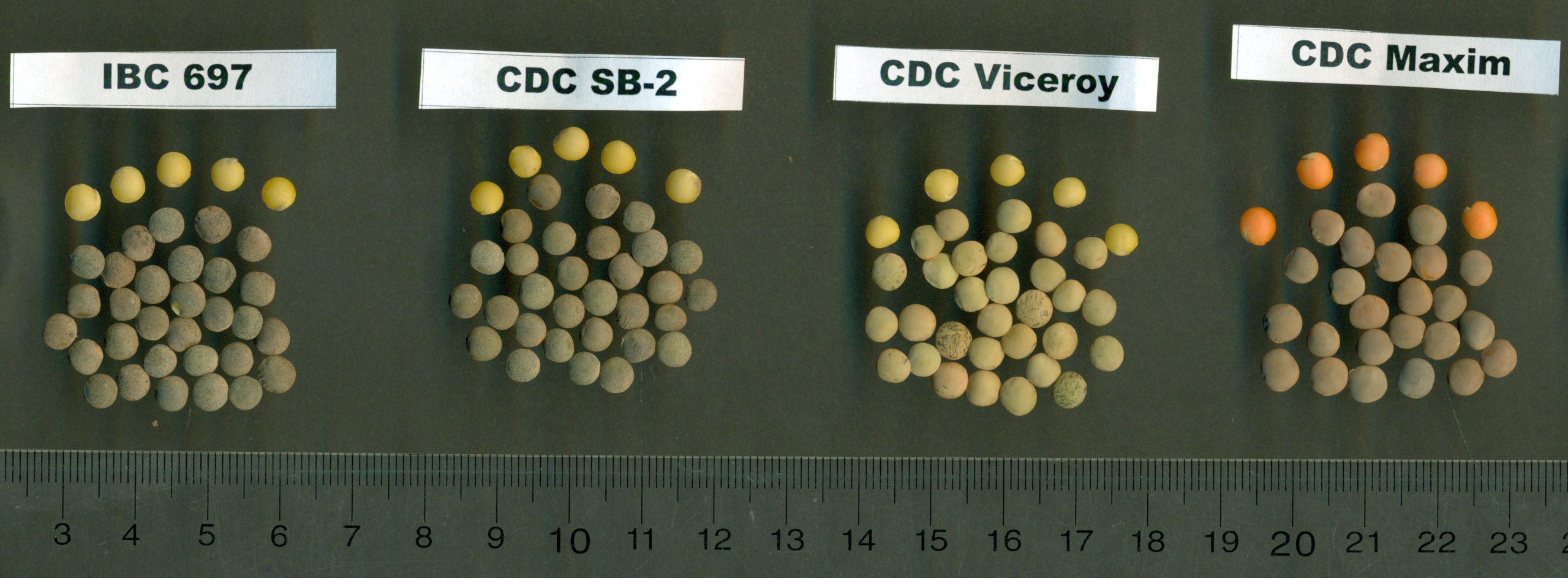CDC SB-3
| Denomination: | 'CDC SB-3' |
|---|---|
| Previously Proposed Denomination: | 'IBC697' |
| Botanical Name: | Lens culinaris |
| Applicant/Holder: |
University of Saskatchewan Crop Development Centre 4D36 Agriculture Building, 51 Campus Drive Saskatoon, Saskatchewan S7N 5A8 Canada |
| Breeder: |
Albert Vandenberg, University of Saskatchewan, Saskatoon, Saskatchewan |
| Application Date: | 2014-05-02 |
| Application Number: | 14-8315 |
| Grant of Rights Date: | 2017-03-24 |
| Certificate Number: | 5458 |
| Grant of Rights Termination Date: | 2037-03-24 |
Variety Description
Varieties used for comparison: 'CDC SB-2', 'CDC Viceroy' and 'CDC Maxim'
Summary: The cotyledons of 'CDC SB-3' are greenish yellow whereas those of 'CDC Maxim' are orange. The standard of the flower of 'CDC SB-3' is violet whereas that of 'CDC Viceroy' and 'CDC Maxim' is white. At maturity, the pods of 'CDC SB-3' are shorter than those of 'CDC Viceroy' and 'CDC Maxim'. The seed of 'CDC SB-3' is very narrow with two colours whereas that of 'CDC Maxim' is narrow with one colour. The profile of the seed of 'CDC SB-3' is elliptic in longitudinal cross section whereas it is broad elliptic for 'CDC SB-2'. The seed testa of 'CDC SB-3' is grey with a violet dotted pattern whereas that of 'CDC Viceroy' is green with a grey mottled pattern.
Description:
PLANT: late maturing
STEM: weak to medium intensity of anthocyanin colouration
LEAF: elliptic, rudimentary to prominent tendrils
FLOWER: flowers mid-season, medium to large size, violet standard with medium intensity of violet stripes, white wings
POD: mainly two ovules per pod, no anthocyanin colouration, yellow at maturity, truncate apex
DRY SEED: very narrow width, elliptic profile in longitudinal cross-section, two colours of testa, grey testa with violet dotted pattern, greenish yellow cotyledon, dull brown hilum
Origin & Breeding History: 'CDC SB-3' (experimental designation IBC697) was developed from the cross 'CDC SB-2' /// 'CDC SB-2' // 'CDC SB-2' / 'IBC145' carried out in 2010 at the Crop Development Centre at the University of Saskatchewan, Saskatoon, Saskatchewan. Selections were made in the F1 to F4 generations, where 9 sub-lines were used to establish the breeder seed. Throughout the generations, selections were based on yield, seed weight, seed size (including diameter and plumpness), seed coat colour, cotyledon colour, days to flowering, days to maturity, resistance to lodging, plant height, herbicide tolerance and disease resistance. 'CDC SB-3' was entered in and evaluated as IBC697 in the Pulse and Special Crops Cooperative Registration Tests in 2012 and 2013.
Tests & Trials: The tests and trials for 'CDC SB-3' were conducted at the Crop Development Centre of the University of Saskatchewan, Saskatoon, Saskatchewan during the summers of 2014 and 2015. The trials were conducted using a RCB Design consisting of 2 replications per variety. Each replicate consisted of 3 rows spaced 30 cm apart, with a row length of 3.66 metres and a planting density of 95 seeds per square metre. Measured characteristics were based on 20 measurements per variety per year. Mean differences were significant at the 5% confidence probability level based on a paired Student's t-test.
Comparison table for 'CDC SB-3' with reference varieties 'CDC SB-2', 'CDC Viceroy' and 'CDC Maxim'
Pod length at maturity (excluding beak) (cm)
| 'CDC SB-3' | 'CDC SB-2' | 'CDC Viceroy' | 'CDC Maxim' | |
|---|---|---|---|---|
| mean 2014 | 1.2 | 1.3 | 1.3 | 1.3 |
| std. deviation 2014 | 0.1 | 0.1 | 0.1 | 0.1 |
| mean 2015 | 1.2 | 1.2 | 1.3 | 1.3 |
| std. deviation 2015 | 0.10 | 0.06 | 0.05 | 0.10 |
Click on image for larger view

Lentil: 'CDC SB-3' (left) with reference varieties 'CDC SB-2' (centre left), 'CDC Viceroy' (centre right) and 'CDC Maxim' (right)
- Date modified: